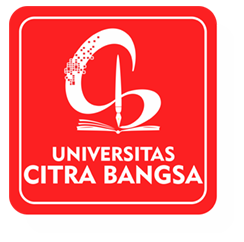PENGARUH PENERAPAN MODEL PEMBELAJARAN KOOPERATIF TIPE JIGSAW TERHADAP PENINGKATAN HASIL BELAJAR BAHASA INDONESIA SISWA KELAS III SD KRISTEN CITRA BANGSA KOTA KUPANG TAHUN PELAJARAN 2018/2019
Keywords:
Kooperatif,, Jigsaw,, terhadap, Hasil Belajar, Cooperative,, towards,, Learning Outcomes.Abstract
ABSTRAK
Amfotis, Yosefina, 2019,(“ Pengaruh Penerapan Model Pembelajaran Kooperatif Tipe Jigsaw Terhadap Peningkatan Hasil Belajar Bahasa Indonesia Siswa Kelas III SD Kristen Citra Bangsa Kota Kupang Tahun Pelajaran 2018/2019”). Skripsi, Program Studi Pendidikan Guru Sekolah Dasar, Universitas Citra Bangsa. Pembimbing: (Heryon B. Mbuik, S.PAK.,M.Pd dan Asti Yunita Benu, S.Pd.,M.Pd).
Penelitian ini dilatar belakangi oleh hasil pengamatan dan pengalaman peneliti, bahwa pembelajaran Bahasa Indonesia di Sekolah Dasar masih didominasi oleh aktifitas guru. Dalam proses pembelajaran berlagsung siswa tidak terlibat dalam pembelajaran sehingga berdampak pada motivasi siswa kurang optimal, yang pada akhirnyahasil belajar siswa kurang memenuhi KKM.
Penelitian ini bertujuan untuk mendapatkan informasi dan analisis mengenai pegaruh model pembelajaran kooperatif tipe jigsaw terhadap peningkatan hasil belajar siswa. Hipotesis penelitian adalah terdapat pengaruh positif secara langsung model pembelajaran kooperatif terhadap peningkatan hasil belajar siswa.
Metode penelitian yang digunakan dalam peelitia ini adalah metode eksperimen. Populasinya adalah seluruh siswa kelas III SD Kristen Citra Bangsa Kota Kupang Tahun 2018/2019, berjumlah 120 orang. Sampel berjumlah 25 orang, teknik pengambilan sampel menggunakan probality samling dengan jenis simple random sampling (secara acak).
Instrumen yang digunakan untuk mendapatkan data variabel model pembelajaran kooperatif tipe jigsaw, dan hasil belajar dengan lembar observasi dan tes. Uji validitas dihitung dengan Product Moment, Reliabelitas dihitung dengan Spearman Brown, tingkat kesukaran soal dan daya pembeda soal dianalisis dengan Microsoft Office Exel 2007, untuk uji normalitas, homogenitas dan uji t-test datanya dianalisis menggunaka statistik dengan bantuan aplikasi SPSS versi 20 tahun 2019.
Hasil peelitian menunjukkan bahwa: terdapat pengaruh yang sigifikan secara positif penerapan model pembelajaran kooperatif tipe jigsaw terhadap penigkatan hasil belajar Bahasa Indonesia siswa kelas III SD Kristen Citra Bangsa Kota Kupang tahun ajaran 2018/2019. Hal ini dibuktikan dengan hasil perolehan analisis data dimana nilai rata-rata (mean) dari hasil belajar siswa kelas eksperimen dan kelas kontrol adalah 81,83 > 77,67 dan diperoleh taraf signifikan 0,000 < 0,05 sehingga Ha diterima.
ABSTRACT
Amfotis, Yosefina, 2019, ("The effect of the application of the of jigsaw cooperative learning model on improving indonesian language learning outcoms for 3 grade studens of chcistian elementary school, the image of the nation of kupan city in the 2018/2019 akademic year"). Thesis, Elementary School Teacher Education Study Program, Citra Bangsa University. Supervisor: (Heryon B. Mbuik, S.PAK., M.Pd dan Asti Yunita Benu, S.Pd.,M.Pd)
This research is motivated by the observations and experiences of researchers, that learning Indonesian in elementary schools is still dominated by teacher activities. In the learning process, students are not involved in learning so that the impact on student motivation is less than optimal, which ultimately results in student learning not fulfilling the KKM.
This study aims to obtain information and analysis regarding the effect of the type of jigsaw cooperative learning model on improving student learning outcomes. The research hypothesis is that there is a direct positive effect on cooperative learning models on improving student learning outcomes.
The research method used in this study is the experimental method. The population is all students of class III Citra Bangsa Christian School in Kupang in 2018/2019, totaling 120 people. The sample is 25 people, the sampling technique uses probality samling with the type of simple random sampling (randomly).
The instrument used to obtain variable data is a type of jigsaw cooperative learning model, and learning outcomes with observation sheets and tests. The validity test was calculated by Product Moment, the reliability was calculated by Spearman Brown, the level of difficulty of the questions and the differentiation of the questions were analyzed with Microsoft Office Exel 2007, for normality, homogeneity and t-test data tests were analyzed using statistics with the help of SPSS application version 20 in 2019.
The results of the study showed that: there was a significant positive effect on the application of the Jigsaw cooperative learning model to the improvement of Indonesian language learning outcomes for third grade students of Citra Christian Elementary School in Kupang City in 2018/2019. This is evidenced by the results of the acquisition of data analysis in which the mean value of the learning outcomes of the experimental and control class students was 81.83> 77.67 and a significant level of 0.000 <0.05 was obtained so that Ha was accepted.
Downloads
Published
Issue
Section
License
Every works in SPASI is licensed under a Creative Commons Attribution-ShareAlike 4.0 International License.
Authors who publish with this journal agree to the following terms:
- Authors retain copyright and grant the journal right of first publication with the work simultaneously licensed under a Creative Commons Attribution License that allows others to share the work with an acknowledgment of the work's authorship and initial publication in this journal.
- Authors are able to enter into separate, additional contractual arrangements for the non-exclusive distribution of the journal's published version of the work (e.g., post it to an institutional repository or publish it in a book), with an acknowledgment of its initial publication in this journal.
- Authors are permitted and encouraged to post their work online (e.g., in institutional repositories or on their website) prior to and during the submission process, as it can lead to productive exchanges, as well as earlier and greater citation of published work (See The Effect of Open Access).




